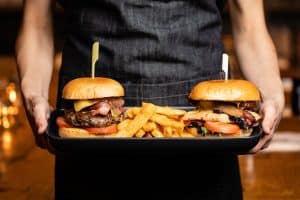 There are many reasons for overeating. No two people are alike and neither are their life experiences. Finding the cause of the problem can help you deal with and eliminate it. Overeating is one of the causes of obesity, which is now the leading cause of preventable deaths. Obesity increases the risk factor of heart disease, type 2 diabetes, and stroke. People don’t usually overeat healthy foods. Instead, they tend to overeat junk food and unhealthy ones.
There are many reasons for overeating. No two people are alike and neither are their life experiences. Finding the cause of the problem can help you deal with and eliminate it. Overeating is one of the causes of obesity, which is now the leading cause of preventable deaths. Obesity increases the risk factor of heart disease, type 2 diabetes, and stroke. People don’t usually overeat healthy foods. Instead, they tend to overeat junk food and unhealthy ones.
You may be an emotional eater.
Food and emotions are often linked. You have comfort food, holiday food associated with good memories, and food you eat when angry or frustrated. Comfort food is usually smooth and easy to eat, like mashed potatoes. People often eat crunchy food like pretzels or crunch hard candy instead of letting it dissolve when angry.
How do you determine whether your overeating is from emotions?
Keeping a food diary helps. Note the servings you ate and how you felt when you ate it. Were you sad? Angry? Or just bored? Identifying when you eat helps you understand why you overate. Think back to childhood. Were your parents people who encouraged you to clean your plate? Do you eat the last bit of food in the pan or serving bowl so you don’t have to throw it away? There are two ways to solve that problem. The first is to make smaller amounts and stick with serving size. The second is learning it’s okay to leave something on your plate.
Mindful eating slows you down if you’re eating too fast.
What is mindful eating? It’s savoring each bite, identifying the flavor, texture, and taste. People who eat fast usually eat more than they should. It takes time for the stomach to fill and signal to the brain that it’s full. When you eat fast, you fill your stomach beyond full capacity long before the brain receives the message. Chewing each bite until it’s a liquid not only takes longer, giving your stomach time to react but also aids digestion.
- Social situations can encourage overeating, especially if you’re a grazer or feel awkward in social situations and hide behind eating. Before you know it, you’ve eaten a full meal of hors d’oeuvres before the actual meal. If you’re at a party, focus on the veggie tray and eat slowly.
- You may overeat out of habit. If you always got a giant burger and large fries when you were younger and more active, you may continue to get it, even though you don’t require as much to eat.
- Do you overeat because you skip meals? Some people skip meals and find they’re ravenous. They guzzle down a meal and without waiting, get a second helping. You can prevent this problem by having a healthy snack to curb your appetite and slow your eating.
- The key is to know why you’re eating. Overeating occurs when you eat past your point of satisfaction. As you eat, ask yourself if you’re hungry or eating for another reason. If you’re worried you’ll be hungry later, have a healthy snack ready to fill the need.
For more information, contact us today at Iron Fit San Antonio
